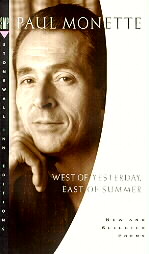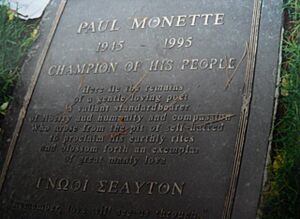Paul Monette facts for kids
Quick facts for kids
Paul Monette
|
|
|---|---|

Monette on the cover of West of Yesterday, East of Summer
|
|
| Born | October 16, 1945 Lawrence, Massachusetts, U.S.
|
| Died | February 10, 1995 (aged 49) |
| Cause of death | HIV/AIDS |
| Resting place | Forest Lawn Memorial Park, Hollywood Hills |
| Alma mater | |
| Occupation |
|
| Known for | The Monette–Horwitz Trust |
|
Notable work
|
|
| Partner(s) |
|
Paul Landry Monette (born October 16, 1945 – died February 10, 1995) was an American writer, poet, and activist. He used his writing to share his experiences and to speak up for important causes.
Contents
Early Life and Education
Paul Monette was born in Lawrence, Massachusetts. He went to Phillips Academy and then to Yale University, graduating in 1967. Growing up, Paul felt like he had to hide a part of himself. He felt that the rules and expectations around him made it hard for him to be his true self. He later wrote about how this feeling of hiding kept him from growing as a person.
After college, he moved to Boston, Massachusetts. There, he taught writing and literature at Milton Academy. In 1978, he moved to West Hollywood with his partner, Roger Horwitz. During this time, Paul started writing and publishing novels. His first novel, Taking Care of Mrs. Carroll, came out in 1978. He later said that some of his early books were "glib and silly." His more serious and important writing came later, inspired by his life experiences and health challenges.
Paul Monette's Important Writings
Paul Monette wrote many books, including novels and memoirs. A memoir is a true story about a part of someone's life.
His 1992 memoir, Becoming a Man: Half a Life Story, was very important. It won the National Book Award for Nonfiction in 1992. This award is one of the biggest honors for writers in America.
Paul also wrote books based on popular movies. These included Nosferatu the Vampyre (1979), Scarface (1983), Predator (1987), Midnight Run (1988), and Havana (1990).
He also wrote other novels like Afterlife (1990) and Halfway Home (1991). These two books focused on characters dealing with serious health challenges and how their families coped. Paul believed that "One person's truth, if told well, does not leave anyone out." He tried to tell honest stories that gave a voice to people who often felt unheard.
Later Life and Legacy

While writing his novel Afterlife, Paul met Stephen Kolzak. Stephen was a television producer known for his work on the TV show Cheers. Paul and Stephen were partners for two years until Stephen passed away in 1990.
Paul Monette's last years, before he passed away due to health issues, are shown in a film called Paul Monette: The Brink of Summer's End. He once said, "go without hate, but not without rage; heal the world." He tried to use his strong feelings to help make the world a better place through his writing and activism. Paul Monette passed away in Los Angeles. He was survived by his partner of five years, Winston Wilde, his father, and his brother. Paul Monette and his earlier partner, Roger Horwitz, are buried next to each other in Forest Lawn Memorial Park (Hollywood Hills), California.
The Monette–Horwitz Trust
Before he passed away in 1995, Paul Monette created something special called the Monette–Horwitz Trust. He did this to honor his relationship with Roger Horwitz. The trust helps support future work that fights against unfair treatment and promotes understanding for people who are different.
The Monette–Horwitz Trust Awards are given out every year. These awards recognize people and groups who work to end prejudice through their writing, research, historical work, or activism. The award committee includes Paul's surviving partner, Winston Wilde, and writer Terry Wolverton.
Some of the first groups to receive this award in 1998 were the Lesbian Herstory Archives and the June L. Mazer Lesbian Archives. Other groups that have received the award include Athlete Ally, Naz Foundation India, and the Addison Gallery of American Art. Many individuals have also been honored, such as Sunil Pant, Lillian Faderman, Allan Bérubé, and Leslie Feinberg.
 | Charles R. Drew |
 | Benjamin Banneker |
 | Jane C. Wright |
 | Roger Arliner Young |

